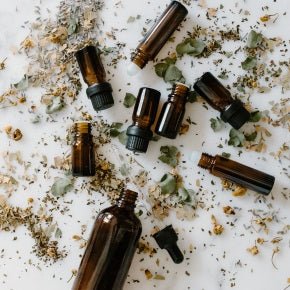This week’s Nutrition News looks at the latest in nutritional research, including two studies that uncover surprising findings for skin support.
Read the very latest here.
Could essential oils support the skin?
Some essential oils contain anti-inflammatory and antimicrobial properties that could support the skin. This recent article by Medical News Today looks at some of the essential oils that show the most potential in this area and the role they could play in managing conditions such as eczema.
Essential oils are plant extracts that are used for a range of functions. The article specifically mentions chamomile, clove, geranium, and tea tree. Chamomile is regarded for its effects of soothing and calming inflamed skin and infections. Cloves and clove oil is considered to hold anti-inflammatory and antimicrobial properties, as does extracts of the geranium shrub. Tea tree oil has antioxidant effects in addition to antimicrobial properties, which help avoid infection in damaged and broken skin.
Lots of everyday occurrences can cause changes in the skin and eczema flare ups such as stress, hormonal fluctuations and injury where an inflammatory response is triggered, which is where essential oils could provide some support. While they have been used for hundreds of years, much more research is needed to establish the role essential oils can play in skincare and your healthcare practitioner should be consulted before using them.
Study uncovers the supplements that could help you sleep
Researchers at the Hong Kong Polytechnic University have found that the supplementation of melatonin, vitamin D, and amino acids, such as L-theanine could have a significant effect on sleep. The research, which has been reported by NutraIngredients, involved analysing 15 different randomised controlled trials (RCTs) in a meta analysis and found that each of these supplements showed a substantial benefit to sleep quality.
The findings were established based on an assessment of sleep quality against the Pittsburgh Sleep Quality Index (PSQI) where, the lower the score, the better the sleep quality. Melatonin showed the most robust data out of the supplements analysed with five out of seven studies showing lower PSQI scores as a result of melatonin supplementation versus the control.
Whilst the findings are positive, the researchers stress that there was high heterogeneity in the melatonin and vitamin D RCTs, so further research, more specifically RCTs with a longer duration and larger sample size, would be needed to verify the results of the meta analysis and confirm the supplements’ role in sleep support.
Could grapes act as a natural suncream?
A recent study covered by NutraIngredients has found that something as simple as eating grapes could help support the skin, protecting it against UV damage. Carried out by researchers at the University of Alabama, Birmingham, the study uncovered a positive correlation between grape consumption and increased resistance to sunburn and a reduction in markers of UV damage at cellular level.
Taking part in the study were 19 healthy participants; the researchers monitored their skin’s response to UV light exposure, which was measured before and after a period of two week grape consumption. The results showed a 74.8% increase in UV protection, with the grape diet associated with decreased DNA damage, fewer skin cell deaths and a reduction in inflammatory markers.
It is thought that the polyphenol content of the grapes could be the reason behind their protective effects. Describing grapes as the potential for being an “edible sunscreen” the study suggests that they could offer an additional layer of protection to topical sunscreens sold commercially. The study’s results are promising and stand as a solid base from which further research can be conducted to establish whether an oral photoprotective product could be produced from a natural source.
Share your thoughts
Agree with the findings in this week’s Nutrition News? Share your thoughts with us on Facebook and Twitter.
 Alison is Director and Founder of Metabolics who writes about Metabolics updates, events and natural healthcare. Her experience and passion for natural supplements and healthcare comes from her years of experience as a practising osteopath, having founded Metabolics in her search for high quality, natural products in her own work. Alison has been a qualified and practising Osteopath since 1981 and regularly gives seminars on a range of healthcare subjects to the wider practitioner community helping share her knowledge and experience.
Alison is Director and Founder of Metabolics who writes about Metabolics updates, events and natural healthcare. Her experience and passion for natural supplements and healthcare comes from her years of experience as a practising osteopath, having founded Metabolics in her search for high quality, natural products in her own work. Alison has been a qualified and practising Osteopath since 1981 and regularly gives seminars on a range of healthcare subjects to the wider practitioner community helping share her knowledge and experience.




